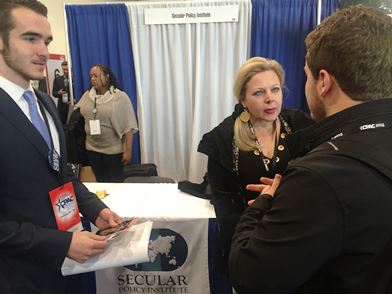SPI at CPAC - The Secular Policy Institute hosted at table at the annual Conservative PAC event at the National Harbor.  SPI CEO Edwina Rogers is photographed on the right discussing the importance of separation of religion and government with two Liberty University students.  After a protracted discussion, the students even decided to join. In fact, in the end, hundreds of conservatives agreed to the mission of SPI and joined the Think Tank; although many were already secularist or non-theists.
The Conservative Political Action Conference is an annual political conference attended by conservative activists and elected officials from across the United States. CPAC is hosted by the American Conservative Union(ACU).
All of the major Republican presidential hopefuls made appearances. ┬áRand Paul won the CPAC high-profile straw poll for a third straight year Saturday. ┬áThe Kentucky senator carried 25.7% in the Conservative Political Action Conference poll, while Wisconsin Gov. Scott Walker finished second with 21.4% ÔÇö a closer-than-expected tally in this early test of political strength among conservative Republican activists. ┬áSen. Ted Cruz, R-Texas, finished third with 11.5%, followed closely by retired neurosurgeon Ben Carson with 11.4%. ┬áFormer Florida governor Jeb Bush ÔÇö perhaps the most criticized candidate at this conservative conclave ÔÇö finished fifth at 8.3%. ┬áOther potential presidential candidates ÔÇö including Marco Rubio, Chris Christie, and Rick Perry ÔÇö had less than 4% in the straw poll. Paul also won CPAC contests in 2013 and 2014. ┬á Attendees┬áagreed on the need for a conservative nominee but said the GOP needs to reach out to moderates who may hold different views on immigration, education and foreign policy and will be needed to win the presidential vote in 2016.
Israeli Prime Minister Benjamin Netanyahu┬áin a speech this week in Washington struck a conciliatory tone, saying that despite controversy surrounding his Tuesday address to Congress, Israel and the United States “will weather this storm.”
Polling has shown Americans disapprove of House Speaker John Boehner’s move to invite Netanyahu to speak to Congress without notifying the White House. That, and the timing of the speech so close to the Israeli election, has critics accusing Boehner and Netanyahu of politicizing the issue of Iranian nuclear talks.
But in his address to the American Israel Public Affairs Committee, the Prime Minister challenged those critics, insisting that his┬áTuesday speech is “not intended to inject Israel into the American partisan debate,” and reaffirming his support for President Barack Obama.
Netanyahu instead framed his congressional address as part of a “moral obligation” to sound the alarm on Iran, which he warned has “vowed to annihilate Israel.”
The world must not enter into the nuclear arms deal with Iran that is now being negotiated between Iran and six world powers, including the United States, Israeli Prime Minister Benjamin Netanyahu told a joint meeting of Congress.
The proposed deal “paves Iran’s path to the bomb” and leaves the world with a threat of a nuclear war, Netanyahu said.
The Israeli leader said Iran is playing a game of “hide and cheat” with international nuclear inspectors and that no deal should come until Iran stops its aggression toward its neighbors, stops supporting terrorism around the world and stops threatening Israel.
US House - The U.S. House passed a clean funding bill to fund the Department of Homeland Security through September, sending the bill to President Barack Obama and averting a partial shutdown of the department. The vote was 257-167.
House Speaker John Boehner relented by allowing the vote without provisions blocking the President’s actions on immigration.
US Senate - The Senate will turn to the Iran Nuclear Agreement Review Act (S. 615) next after the Ambush Elections CRA and Keystone override votes.  The Senate still plans to move to Human Trafficking legislation this five week work period.
U.S. Senate Majority Leader Mitch McConnell said on Tuesday the chamber was moving toward debate on a bill that would require President Barack Obama to submit any final nuclear deal with Iran for Congress’ approval.
The White House has said Obama would veto the Iran Nuclear Review Act, which was introduced by Republican Senator Bob Corker, chairman of the Senate Foreign Relations Committee, and Democratic Senator Robert Menendez, the top Democrat on the panel.
McConnell, a Republican, told his weekly news conference that he intended to debate the bill in the Senate next week.
Harry Reid, the top Democrat in the Senate, suggested that lawmakers wait to debate the bill until they know what has happened in the talks, given that there are only three weeks left before negotiators pledged to have the outlines of a final agreement.
Looking Ahead:
Legislative items that are possible during this work period include:  Nominations, Ambush Election Resolution of Disapproval, Keystone Override, Human Trafficking bills, and the Budget Resolution.

